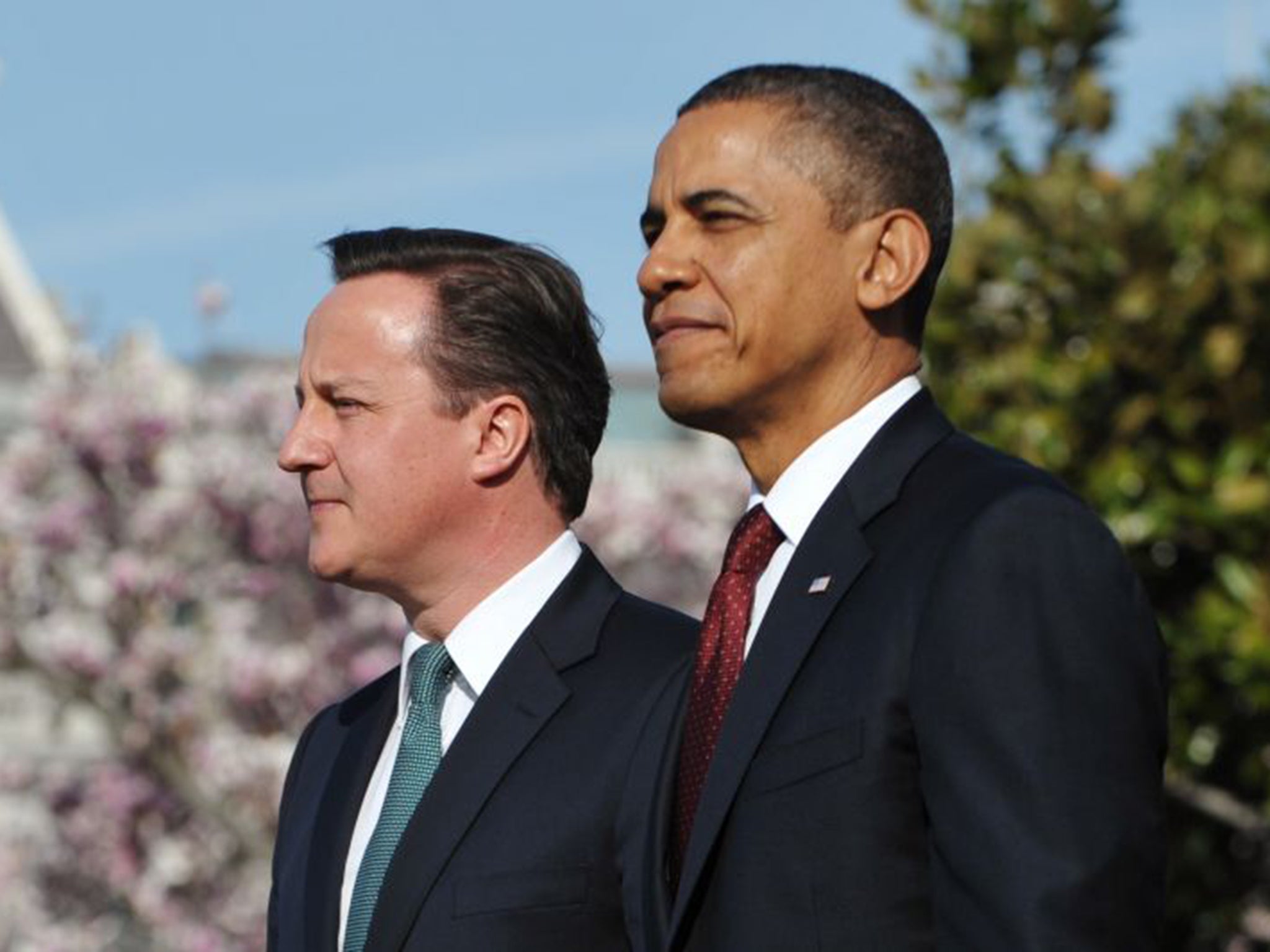Washington sees Britain as its closest ally, but feels it is failing to live up to expectations on the world stage
Out of America: The election outcome does not change the fact that the 'special relationship' is currently less special than it has been for decades


Be careful what you wish for. Britain’s general election last week surely produced Washington’s preferred outcome: another Tory government and, against all the odds, one that can rule alone at Westminster. The devil you know rather than the one you don’t, and no need for Italianate political contortions to cobble together a majority. Banished, too, is the spectre of a minority Labour government reliant on a secessionist, throw-the-missiles-out SNP for survival.
But not so fast. For all David Cameron’s day-after talk of a “greater Britain”, there is no disguising reality. The election outcome does not change the fact that the American alliance – the “special relationship” – which has been the bedrock of British foreign policy since the Second World War, is currently less special than it has been for decades. Nor does it spell an end to US concern and frustration over the future course of the country that has traditionally been its most reliable and heaviest-hitting partner.
Barely 48 hours later, that reality is sinking in among US policymakers. The Tory triumph has heightened the two great dangers facing the realm: a referendum that could end UK membership of the EU, crucial, in Washington’s eyes, for Britain’s global standing; and the stunning Nationalist takeover of Scotland. At the very least, Britain will remain inward-looking, more concerned with its own problems than helping to resolve those of the wider world.
Nor, finally, is it to ascribe the outgoing government’s lack of interest in foreign affairs to an abject collapse of the national will. Problems with Scotland and the EU might have been avoided by more far-sighted policies in the past. But there’s no escaping them now; to all intents, they are existential crises, whose solution is paramount for Britain. Not necessarily, however, for the US.
Washington sees things through a different prism. It notes Britain’s virtual absence from the Ukraine crisis. It remembers how, mindful of a repeat of Iraq, the Commons in 2013 scotched British participation in air strikes against the Syrian regime, despite its use of chemical weapons – and in the process scotched America’s plans, too. It sees Britain stand aloof from the shambles that is Libya, and as a marginal contributor, at best, to the air campaign against Islamic State.

Such semi-detachment is borne out by the numbers. There is a strong likelihood that Britain’s defence spending as a share of GDP will fall below the Nato target of 2 per cent to which it is theoretically committed. Without an aircraft carrier in full service until 2020, the country cannot project global power. By some accounts, cuts in the Army will reduce manpower to the lowest level for more than two centuries.
These cuts are not unique among Nato’s European members. But France, the EU country against which Britain most likes to measure itself, is boosting military spending, and taking a more visible role in the fight against Islamic radicalism in Africa and the Middle East. Further irritating the US was Britain’s decision, in defiance of Washington, to sign up for a Chinese version of the World Bank.
From a neutral point of view, there’s nothing wrong with that. Countries follow their interests (economic in this case); they are not obliged to slavishly follow the dictates of a dominant ally. Nor, despite polls which suggest that we want to remain a major world power, are votes to be won in Britain by higher defence spending (unlike in the US, where no party can win an election if it is perceived as weak on national security).

Here, too, Britain’s seeming insouciance alarms Americans, as emblematic of a continent that is rich but so wedded to the quiet life that it still relies on the US to defend it – even as a new cold war looms, with an assertive and nationalistic Russia. What, one may ask, has been the dominant single image of British foreign policy in the Cameron era? The unkind but telling answer is surely the improbable duet of former foreign secretary William Hague and the actress Angelina Jolie, launching a campaign against sexual violence in conflict zones. Magnifique, perhaps, mais ce n’est pas la guerre.
But all is not lost. America’s worries about Britain also reflect self-interest. Every country, even a superpower, would prefer to act with steadfast allies in a crisis, rather than go it alone. Britain’s qualifications are unequalled: a nuclear power with a permanent seat on the UN Security Council, membership of the overlapping clubs of Nato, the EU and the Commonwealth, a Rolls-Royce of a diplomatic service, intimate intelligence ties, London’s position as a global financial centre, a shared language and culture and – at least until recently – a greatly admired military.
Yes, there are alternatives. In Atlanticist terms, Germany, the EU’s economic superpower, is the obvious contender. But history’s inhibitions still lie heavy upon German leadership. Japan, others suggest, amid the talk about a US “pivot to Asia” and the recent highly successful state visit here by Prime Minister Shinzo Abe, sealing an expanded security role for Tokyo for the first time since the Second World War. Or even Israel (pace the unloved Benjamin Netanyahu), America’s protégé in a Middle East from which it yearns to pivot but can’t. None, though, offers quite the easy familiarity that Britain does. The real question is, is Britain ready to make the effort required? Right now the answer seems to be no.
Join our commenting forum
Join thought-provoking conversations, follow other Independent readers and see their replies
Comments